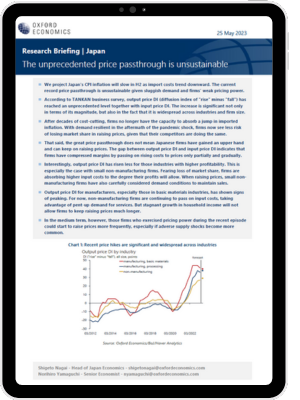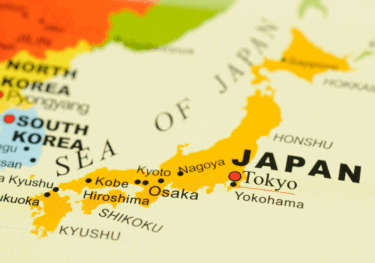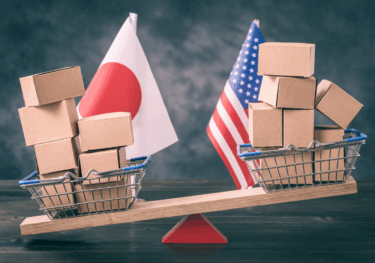The unprecedented price passthrough is unsustainable in Japan

We project Japan’s CPI inflation will slow in H2 as import costs trend downward. The current record price passthrough is unsustainable given sluggish demand and firms’ weak pricing power.
What you will learn:
- After decades of cost-cutting, firms no longer have the capacity to absorb a jump in imported inflation. With demand resilient in the aftermath of the pandemic shock, firms now see less risk of losing market share in raising prices, given that their competitors are doing the same.
- That said, the great price passthrough does not mean Japanese firms have gained an upper hand and can keep on raising prices. The gap between output price DI and input price DI indicates that firms have compressed margins by passing on rising costs to prices only partially and gradually.
- Output price DI for manufacturers, especially those in basic materials industries, has shown signs of peaking. For now, non-manufacturing firms are continuing to pass on input costs, taking advantage of pent-up demand for services. But stagnant growth in household income will not allow firms to keep raising prices much longer.
Tags:
Related posts

Post
Tariffs and Politics Leave the BoJ Powerless in Japan
The Bank of Japan kept its policy rate at 0.5% at its July meeting. We continue to think the BoJ will exercise caution on rate hikes despite still-high inflation and a recent trade deal with the US.
Find Out More
Post
US-Japan Trade Deal Fails to Shift Japan’s Growth Outlook
We estimate that the US's effective tariff rate on Japanese products is around 17%, in line with our baseline assumption. Lower tariffs on autos are a positive, given the sector's significant contribution to the economy and its broad domestic supporting base
Find Out More
Post
Japan’s Rising Political Instability Will Undermine Fiscal Discipline
The ruling Liberal Democratic party (LDP) and its partner Komeito lost their majority in Japan's upper house elections on July 20. Although Prime Minister Shigeru Ishiba will likely stay to avoid political gridlock, especially to complete tariff negotiations with the US, the political situation has become fluid and could lead to a leadership change or the reshuffling of the coalition.
Find Out More